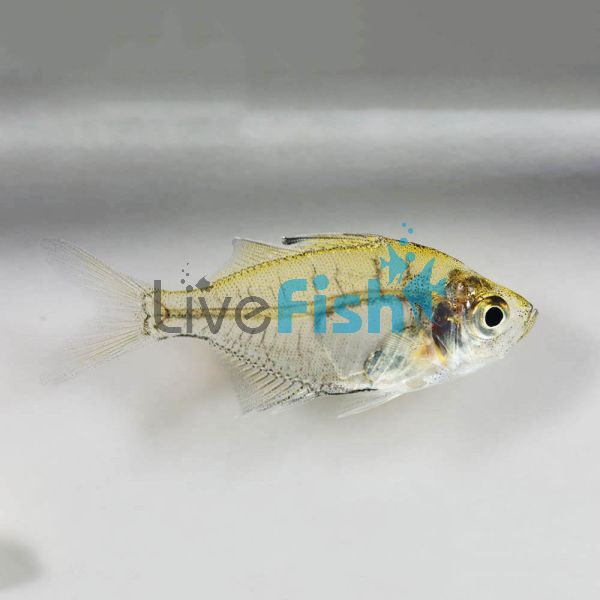Indian Glass Fish 2cm
The Indian glass fish, also known as the Indian glass perch is a simple and unique freshwater fish native to the rivers and streams of India and Bangladesh. These fish are known for their transparent body that allows you to see their internal organs, making them a popular choice for aquarium enthusiasts who want to add a touch of novelty to their tanks. They are relatively easy to care for fish and will look amazing in an Indian river biotope-style tank paired with other native Indian species.
- Buy 5 for $3.60 each and save 10%
- Buy 10 for $3.40 each and save 15%
- Buy 15 for $3.20 each and save 20%
Indian Glass Fish
The Indian glass fish, also known as the Indian glass perch is a simple and unique freshwater fish native to the rivers and streams of India and Bangladesh. These fish are known for their transparent body that allows you to see their internal organs, making them a popular choice for aquarium enthusiasts who want to add a touch of novelty to their tanks. They are relatively easy to care for fish and will look amazing in an Indian river biotope-style tank paired with other native Indian species.
The Indian glass fish have a slender, coin-shaped body that maxes out at around 8 - 10 cm. The majority of these fish are transparent however they can show shades of pale to dark green, and they have a series of horizontal stripes that are more prominent in younger fish. The fins of the Indian glass fish are also transparent and maintain a hint of green. The Indian glass fish is a peaceful and relatively easy-to-care-for species that prefer to swim in schools of at least six individuals. These fish are active and enjoy swimming in open water areas once they are settled in which is why they are such a great oddball community fish.
The Indian glass fish is generally a hardy and long-lived species that can live up to 5 years with proper care. They are not known to be particularly aggressive, but they can be territorial during breeding. Breeding Indian glass fish in captivity can be challenging, and it usually requires a separate breeding tank with specific water conditions and careful attention to feeding and water changes. Differentiating males and females is also not the easiest task as these fish do not show any dimorphic traits hence why breeding these fish is not intentional.
Tank Recommendations for your Indian Glass Fish
The minimum tank size for a group of six Indian glass fish is at least 70 liters, but larger tanks are better, especially if you plan to keep other fish species in the same tank. These fish appreciate a well-planted tank with plenty of open swimming space, as well as hiding places provided by driftwood, rocks, or caves. Adding a powerhead aimed at the surface or using an air-stone in the tank will ensure that the water is well-oxygenated. They prefer slightly acidic water with a pH between 6.0 and 7.5, and a temperature range of 24-28°C.
Suitable Tank Buddies
Indian glass fish are peaceful and can be kept with other non-aggressive species. They do best in a community tank with other small, slow-moving, peaceful fish species.
Usually Compatible
Small peaceful species such as tetras, rasboras, sparkling gouramis, and other community species.
Sometimes Compatible
Fast-moving or semi-aggressive species such as barbs, angelfish, and larger gouramis may not be suitable for Indian glass fish due to their territorial behavior.
Rarely Compatible
Avoid keeping Indian glass fish with aggressive or predatory species, as well as any fish that may nip at their fins.
Feeding your Indian Glass Fish
In the wild, the Indian glassfish feeds on small aquatic organisms such as insects, crustaceans, and worms. In captivity, they are not particularly picky and can be fed a variety of foods including flakes, pellets, and frozen foods like bloodworms and brine shrimp. They are omnivorous and benefit from a varied diet that includes both protein and vegetable matter.
| Scientific Name | Parambassis Ranga |
|---|---|
| Care Level | Easy |
| Common Names | Indian Glass Fish, Indian Glass Perch, Olive Glass Perch |
| Diet | Omnivore |
| Fish Family | Chandidae |
| Lifespan (years) | 4 |
| Max. Length (cm) | 10 |
| Min. Tank Volume (l) | 70 |
| Origin | India & Bangladesh |
| Reef Safe | Yes |
| Sociability | Peaceful |
| Venomous | No |
| Water Conditions | 24-28° C, pH 6.0-7.5 |




